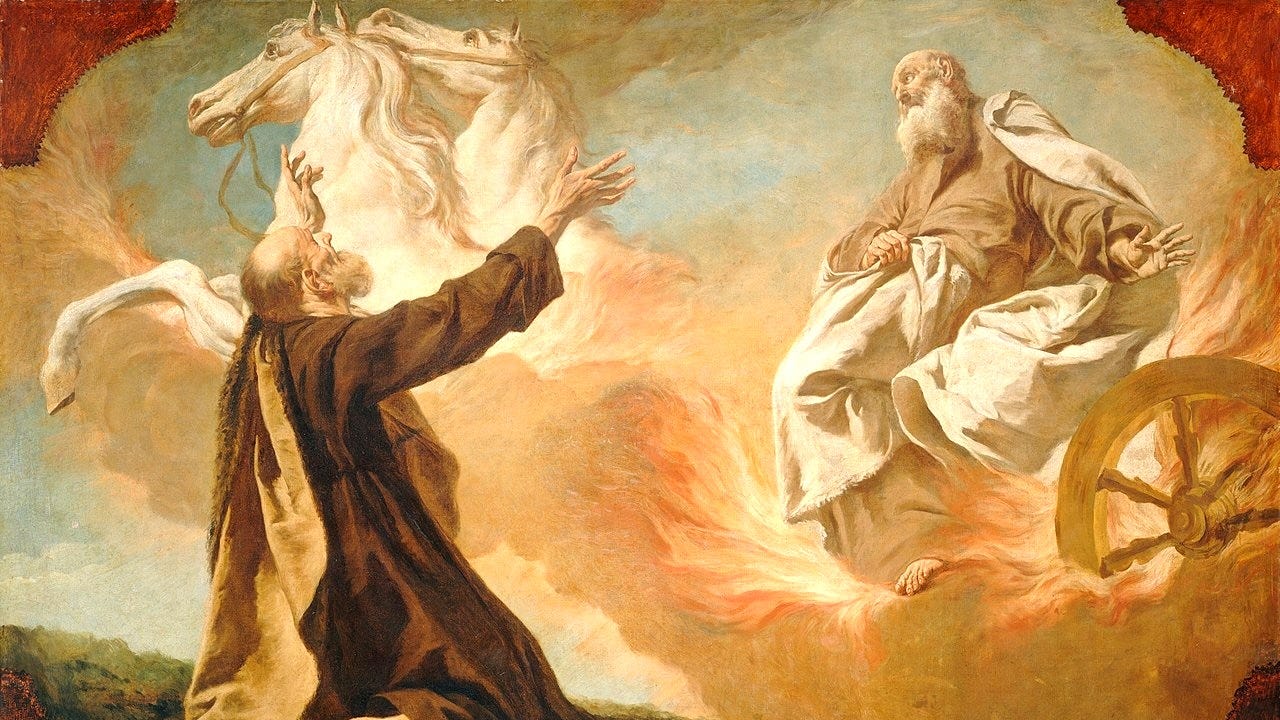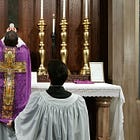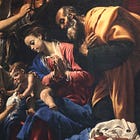Was St John the Baptist really the Prophet Elias/Elijah?
What did Our Lord mean when he said that St John the Baptist was 'Elias that is to come'—especially when the Baptist denied that he was Elias at another point?

In the previous pieces, Fr Coleridge told us…
How Christ’s miracles confirmed Him as the Messias to St. John’s disciples, whose master worked no miracles.
How Christ’s praise of St. John dispelled misconceptions about his faith.
Why St. John holds a unique place in salvation history: foretold by prophecy, he prepared hearts for Christ through penance and baptism.
In this part, he tells us…
How the Baptist stands as the transitional figure between the Old and New Dispensations, ushering in a wave of grace that spurred multitudes to seek the Kingdom of Heaven with fervour.
Why he is uniquely praised for his role in stirring repentance, fulfilling prophecy, and paving the way for Christ’s ministry, combining traits of both the Old Testament prophets and New Testament preachers.
What the Jews misunderstood about the dual fulfilment of the prophecy regarding Elias, and how St. John embodied the "spirit and power of Elias" before Christ’s first coming.
He also shows that St. John’s mission exemplified humility and obedience to God’s providence—while rejection of his ministry of anyone at the time signified a dangerous spiritual pride and resistance to salvation.
This Gospel is read on the Second Sunday of Advent.
It is curious that the Advent Gospel readings appear in reverse chronological order:
The last witness of St John the Baptist (and Our Lord’s witness to him)
St John the Baptist’s declaration of his mission
The first witness of St John the Baptist.
This reverse chronological order also recalls the curious mnemonic ‘ERO CRAS,’ spelt out by a reversal of the ‘O Antiphons’ from the 17th December. It is as if the Roman liturgy is engaging in a kind of “countdown” to Christmas.
These readings also show how central the Forerunner of Christ is in this period.
Naturally, this is because St John the Baptist went before Christ, to prepare the people for his coming. There is a fittingness about these readings appearing in Advent.
However, we should recall that on a strictly rationalist or historical basis, St John the Baptist was still a mere infant at the time of the Nativity. He was not preparing for Christ’s birth, but for his mission and his manifestation.
As such, while readings about his mission certainly has applicability to the historical event of Christmas, they also point to what we have been discussing elsewhere, namely the focus which Advent has on the second coming of Christ at the end of time.
We have addressed this, and how the Roman Liturgy presents this matter, below:
Our Lord’s Witness to St John the Baptist
From
The Training of the Apostles Vol. II
Fr Henry James Coleridge, 1889, Ch. XIV, pp 273-81
St. Matt. xi. 7-19; St. Luke vii. 24,25;
Story of the Gospels, § 53
Sung on the Second Sunday of Advent
The Kingdom of Heaven suffering violence
‘And from the days of John the Baptist until now, the Kingdom of Heaven suffereth violence, and the violent bear it away. For all the Prophets and the Law prophesied until John. And if you will receive it, he is Elias that is to come. He that hath ears to hear, let him hear.’
The first words of this sentence, which is related in this place by St. Matthew alone, though words very similar indeed occur at a later period of our Lord’s teaching in St. Luke, mark the position of St. John in the Divine counsels, both with relation to what had preceded him, and to what came after him.
He is placed by our Lord at the end of the Old Dispensation, and at the beginning of the New, and it is made his especial praise that he has given the first impulse and start, if we may so speak, to the general movement of souls eagerly availing themselves of the blessings of the later Dispensation.
‘From the days of John the Baptist until now, the Kingdom of Heaven is suffering violence and the violent are bearing it away.’
Our Lord’s words represent the Kingdom of Heaven as a great treasure which is being violently laid hands on by the people, and being taken away and appropriated by force.
Up to that time it was a hidden or promised treasure, something future and out of the reach of the generality of mankind. Now it is as it were thrown open to all, and more than that, a great impulse or wave of grace has taken possession of multitudes, the force of which carries them over all obstacles and risks for the sake of obtaining the prey which lies before them.
Now this impulse it is that was the great work of St. John. It was the effect of his preaching of repentance. No one of the Prophets had produced such a movement of souls, though it is probable that they were far more frequently preachers and reformers of manners, in the ordinary sense of the term, than simply foretellers of future events.
It is hard to think, for instance, that the prophecy of Jonas at Ninive was simply the announcement of a future chastisement of God on that city. Our Lord contrasts the repentance of the Ninivites with the coldness and dullness of the Jews to His own teaching, and this seems to imply that there was something analogous in the two teachings.
The treatment which the Prophets received at the hands of those to whom they were sent is most easily explained by supposing that they were severe teachers and denouncers of the prevalent vices and sins of their day. But no one of them had produced a reformation of manners and a revival of religion like that produced by the preaching of St. John, and he, moreover, was the close Forerunner of the King of Grace Himself, and so the movement which he set on foot could be taken up and carried on by the whole power of the Gospel Kingdom.
This is the incommunicable praise of St. John. This is the feature in his office on which the prophecies which are applied to him dwell. This is that which is conveyed in the words of the Archangel when the birth of the Baptist was announced to his father, Zachary, and it is that which Zachary himself speaks of in his canticle of rejoicing after that birth had come about.
Thus, besides being so great in the dispensation of the Old Law, he is especially great in the part which he had to play in the opening of the New Kingdom.
The Prophets and the Law
‘For all the Prophets and the Law prophesied until John,’ that is, the Prophets prophesied and the Law reigned, and guided the people to God, up to the time of St. John.
He was the end and crown of that great dispensation, of which the Prophets and the Law were the appointed organs. He broke the silence which had fallen on the prophetic choir since the days of the last of the Prophets. He began a new and spiritual teaching in decided contrast to the authorized teaching of the Law in the synagogues.
His moral teaching was evangelical. We see its purport in the short specimens of which St. Luke has been the recorder in the early chapters of his Gospel. He did not teach with the same authority as our Lord, but his teaching was altogether different in tone from that of the Scribes and Pharisees. He touched the conscience and the heart, and turned men to confession and to penance.
The words in which the teaching of our Lord, when it is first spoken of in the Gospels, is summed up, ‘Repent, and believe the Gospel, the Kingdom of Heaven is at hand,’ are identical with the words which summarize the preaching of St. John. In this respect he belonged to the New Dispensation, as in other respects he belonged to the Old.
Our Lord’s words, therefore, here recorded, signify that St. John put an end and a crown to the teaching of the Law and the Prophets, the Dispensation in which they represented the doctorate authorized by God, and that from him the new Kingdom began.
The rest of this commentary is for members.
Here is the previous part:
Here’s why you should subscribe to The Father Coleridge Reader:
Coleridge provides solid explanations of the entirety of the Gospel
His work is full of doctrine and piety, and is highly credible
He gives a clear trajectory of the life of Christ, its drama and all its stages.
If more Catholics knew about works like Fr Coleridge’s, then other works based on dubious private revelations would be much less attractive.
But sourcing and curating the texts, cleaning up scans, and editing them for online reading is a labour of love, and takes a lot of time.
Will you be a part of this project and hit subscribe?





